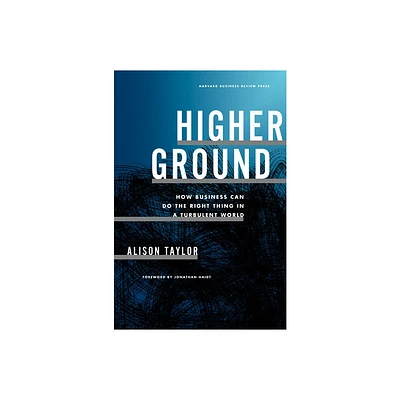Home
Higher Ground [Bonus Tracks]
Loading Inventory...
Barnes and Noble
Higher Ground [Bonus Tracks]
Current price: $16.99
![Higher Ground [Bonus Tracks]](https://cdn.mall.adeptmind.ai/https%3A%2F%2Fprodimage.images-bn.com%2Fpimages%2F0816651011018_p0_v1_s600x595.jpg_640x.jpg)
![Higher Ground [Bonus Tracks]](https://cdn.mall.adeptmind.ai/https%3A%2F%2Fprodimage.images-bn.com%2Fpimages%2F0816651011018_p0_v1_s600x595.jpg_640x.jpg)
Barnes and Noble
Higher Ground [Bonus Tracks]
Current price: $16.99
Loading Inventory...
Size: OS
*Product Information may vary - to confirm product availability, pricing, and additional information please contact Barnes and Noble
The temptation to take on the misguided academic purists in this review is almost overwhelming. Believe it or not, there are those who feel that a group of the stature and vision of the
Blind Boys of Alabama
-- co-founded over 60 years ago by members
Clarence Fountain
,
Jimmy Carter
, and
George Scott
, and filled out by
Joey Williams
Ricky McKinnie
Bobby Butler
-- shouldn't, in essence, engage, let alone record, music from genres other than gospel and spirituals, i.e., pop music. Suffice to say: who better? Give up the nonsense, come to the front of the house, and open not only your mind, but your heart. On their follow-up to the wildly successful
Spirit of the Century
, the
Blind Boys
enlist the phenomenally gifted visionary
Robert Randolph
and
the Family Band
, the great young lions of the
Sacred Steel
tradition as their backing unit, as well as longtime fan, ueber-guitarist, and songwriter
Ben Harper
on a few choice cuts for good measure. The material is stunning, even more so than on
. It was chosen for its ability to be molded into the vocal image of the
, for its ability to split seams between sacred and secular worlds, but also between genres and cultural and societal terrains. In the voices of the
, the song is the vehicle to transcend the burdens of human existence or to celebrate its preciousness.
And what songs: the album opens with the one of the few readings of
Curtis Mayfield
's
"People Get Ready,"
that does not fall into maudlin cliche. Instead, with
Harper
playing guitar and the
Family Band
building a haunting, nearly processional series of ambiences and textures,
Fountain
's singing splits the tune wide open toward a spiritual universe where the flesh is not denied, but is merely called upon to fall away after serving its purpose. It is no longer an exhortation but a plea, a whisper of hope for those who will prepare themselves for the next phase of the journey into places unknown but full of unspoken -- and unspeakable -- promise.
Likewise, on
Prince
"The Cross"
we hear the
delving deeply into the composer's intent that to we need not only willingly bear our own suffering, but that of others, too; we all transcend them on one plane or the next while getting there together. This is followed by the loneliest, most prayerful rendition of
Jimmy Cliff
"Many Rivers to Cross"
since the original was released in the '60s.
's shimmering, in-the-pocket backbeat fills and wanderings over the neck are languid, full of water, tears, in fact; the rhythm section is muted offering a seductively heart-wrenching and syncopated read on the time signature. As the
sing to this accompaniment, it becomes evident that this song in particular bring the worlds of gospel, country, and reggae closely together in a seamless, heartbreaking testament to acceptance and the plea for redemption and companionship in the arid and lonely places. Surely the nomads of the world can take this version of the song as their anthem.
But the proceedings are not all solemn. There's the deep dark celebratory funk of
Stevie Wonder
"Higher Ground,"
with
turning in an amazing wah-wah performance in a woven counterpoint to
Randolph
's edgy, ragged, pedal steel fills. This is followed a couple of tracks later by a sharp and steamy, slinky, rewired read of
Funkadelic
"You and Your Folks,"
which segues across worlds into a gorgeous rendition of the 23rd Psalm.
This is not to say that
Higher Ground
is made up completely of pop tunes. Hardly. There is perhaps the
most authoritative recording of "
Wade in the Water
,"
Aretha Franklin
's gospel classic
"Spirits in the Dark,"
's own strident hymn
"Stand by Me."
There is the stalwart, inspirational tradition of
"Freedom Road"
that is imbued with majesty by not only the
, but the
, as well. There is also the funky
"I May Not Can See,"
written in the modern gospel vernacular, and
"I Shall Not Walk Alone,"
where the
are accompanied only by
John Ginty
's piano. These songs are all done with the chilling clarity that only the best gospel music can deliver; one that challenges our doubt. Nowhere is the unshakable evidence of this truer than on the stark, radical, soul-searing read of
"Precious Lord"
that closes the disc. It is here that the listener is challenged to deny the existence of a spirit so powerful and life-altering that it can address, through song, the desert terrains in the human heart and bring them comfort through the simplicity of song. The
are aided only by
's truly sacred steel, the emotion derived from the Gospel's promise is underscored by hope, devotion, and a faith that may waver in times of trial, but reaffirms itself in its humanity and the sheer love with which it calls upon the burning heart of the Divine for both guidance and deliverance.
In the
legacy, this is not just another milestone, of which there have been many. On
, the group opened up gospel music to new forms and sounds in their choice of material. They have extended not only their reach as individual musicians and as a group, but have exponentially pushed the boundaries of their vocation's genre to new and dizzying heights. In the music on
, genres melt away, holiness and sanctity are synonymous with the grain of the human voice as it longs for the well of the heart's fulfillment; and genres are transformed into the quest for an expression that belies all artificial constructs and aspires to pure spirit. The union of the
carries not only gospel, but all popular music that aspires to higher ground, with more grace and beauty than we had any right to expect. ~ Thom Jurek
Blind Boys of Alabama
-- co-founded over 60 years ago by members
Clarence Fountain
,
Jimmy Carter
, and
George Scott
, and filled out by
Joey Williams
Ricky McKinnie
Bobby Butler
-- shouldn't, in essence, engage, let alone record, music from genres other than gospel and spirituals, i.e., pop music. Suffice to say: who better? Give up the nonsense, come to the front of the house, and open not only your mind, but your heart. On their follow-up to the wildly successful
Spirit of the Century
, the
Blind Boys
enlist the phenomenally gifted visionary
Robert Randolph
and
the Family Band
, the great young lions of the
Sacred Steel
tradition as their backing unit, as well as longtime fan, ueber-guitarist, and songwriter
Ben Harper
on a few choice cuts for good measure. The material is stunning, even more so than on
. It was chosen for its ability to be molded into the vocal image of the
, for its ability to split seams between sacred and secular worlds, but also between genres and cultural and societal terrains. In the voices of the
, the song is the vehicle to transcend the burdens of human existence or to celebrate its preciousness.
And what songs: the album opens with the one of the few readings of
Curtis Mayfield
's
"People Get Ready,"
that does not fall into maudlin cliche. Instead, with
Harper
playing guitar and the
Family Band
building a haunting, nearly processional series of ambiences and textures,
Fountain
's singing splits the tune wide open toward a spiritual universe where the flesh is not denied, but is merely called upon to fall away after serving its purpose. It is no longer an exhortation but a plea, a whisper of hope for those who will prepare themselves for the next phase of the journey into places unknown but full of unspoken -- and unspeakable -- promise.
Likewise, on
Prince
"The Cross"
we hear the
delving deeply into the composer's intent that to we need not only willingly bear our own suffering, but that of others, too; we all transcend them on one plane or the next while getting there together. This is followed by the loneliest, most prayerful rendition of
Jimmy Cliff
"Many Rivers to Cross"
since the original was released in the '60s.
's shimmering, in-the-pocket backbeat fills and wanderings over the neck are languid, full of water, tears, in fact; the rhythm section is muted offering a seductively heart-wrenching and syncopated read on the time signature. As the
sing to this accompaniment, it becomes evident that this song in particular bring the worlds of gospel, country, and reggae closely together in a seamless, heartbreaking testament to acceptance and the plea for redemption and companionship in the arid and lonely places. Surely the nomads of the world can take this version of the song as their anthem.
But the proceedings are not all solemn. There's the deep dark celebratory funk of
Stevie Wonder
"Higher Ground,"
with
turning in an amazing wah-wah performance in a woven counterpoint to
Randolph
's edgy, ragged, pedal steel fills. This is followed a couple of tracks later by a sharp and steamy, slinky, rewired read of
Funkadelic
"You and Your Folks,"
which segues across worlds into a gorgeous rendition of the 23rd Psalm.
This is not to say that
Higher Ground
is made up completely of pop tunes. Hardly. There is perhaps the
most authoritative recording of "
Wade in the Water
,"
Aretha Franklin
's gospel classic
"Spirits in the Dark,"
's own strident hymn
"Stand by Me."
There is the stalwart, inspirational tradition of
"Freedom Road"
that is imbued with majesty by not only the
, but the
, as well. There is also the funky
"I May Not Can See,"
written in the modern gospel vernacular, and
"I Shall Not Walk Alone,"
where the
are accompanied only by
John Ginty
's piano. These songs are all done with the chilling clarity that only the best gospel music can deliver; one that challenges our doubt. Nowhere is the unshakable evidence of this truer than on the stark, radical, soul-searing read of
"Precious Lord"
that closes the disc. It is here that the listener is challenged to deny the existence of a spirit so powerful and life-altering that it can address, through song, the desert terrains in the human heart and bring them comfort through the simplicity of song. The
are aided only by
's truly sacred steel, the emotion derived from the Gospel's promise is underscored by hope, devotion, and a faith that may waver in times of trial, but reaffirms itself in its humanity and the sheer love with which it calls upon the burning heart of the Divine for both guidance and deliverance.
In the
legacy, this is not just another milestone, of which there have been many. On
, the group opened up gospel music to new forms and sounds in their choice of material. They have extended not only their reach as individual musicians and as a group, but have exponentially pushed the boundaries of their vocation's genre to new and dizzying heights. In the music on
, genres melt away, holiness and sanctity are synonymous with the grain of the human voice as it longs for the well of the heart's fulfillment; and genres are transformed into the quest for an expression that belies all artificial constructs and aspires to pure spirit. The union of the
carries not only gospel, but all popular music that aspires to higher ground, with more grace and beauty than we had any right to expect. ~ Thom Jurek
![Stand Your Ground [Bonus Tracks] [Remastered] [Deluxe]](https://prodimage.images-bn.com/pimages/5055300357366_p0_v1_s600x595.jpg)





![Higher Ground [Blu-ray]](https://prodimage.images-bn.com/pimages/0043396392168_p0_v3_s600x595.jpg)



![Mojado [Bonus Track]](https://prodimage.images-bn.com/pimages/0807934578625_p0_v1_s600x595.jpg)
![Nightlife [Bonus Track]](https://prodimage.images-bn.com/pimages/0693723985527_p0_v1_s600x595.jpg)






